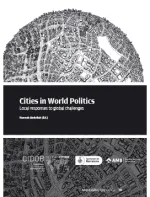Climate change mitigation and the SDGs in urban India: synergies and conflicts

In 2014 a report by the Intergovernmental Panel on Climate Change (IPCC) warned that the impacts of climate change, such as heat waves, floods, storm surge, and health epidemics adversely impact the poor and disadvantaged, particularly in urban areas (Revi et al., 2014). Four years later, in its report highlighting the importance of limiting temperature rises by 2100 to 1.5°C above pre-industrial levels (rather than the previous target of 2°C), the IPCC stated that “Climate change impacts and responses are closely linked to sustainable development which balances social well-being, economic prosperity and environmental protection. The United Nations Sustainable Development Goals [SDGs] provide an established framework for assessing the links between global warming of 1.5°C or 2°C and development goals that include poverty eradication, reducing inequalities, and climate action” (IPCC, 2018: 20). It warned that any adaptation and mitigation efforts must work in tandem with the SDGs (IPCC, 2018: 21). Questions of ethics and equity need to be considered when addressing both impacts and mitigation efforts in order to highlight uneven distribution of possible adverse effects on disadvantaged sections of societies.